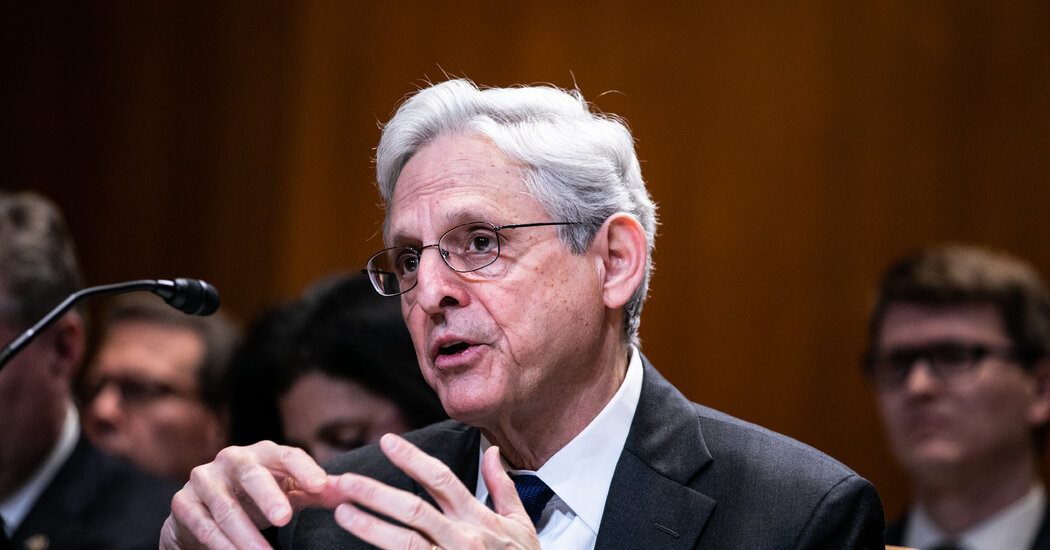Attorney General Merrick B. Garland was 4,000 miles away from Delaware on Tuesday when federal prosecutors announced a deal for Hunter Biden on tax an
Attorney General Merrick B. Garland was 4,000 miles away from Delaware on Tuesday when federal prosecutors announced a deal for Hunter Biden on tax and gun charges that would most likely ensure he does not serve a prison sentence.
It reflected the distance Mr. Garland has sought from the investigation into his boss’s son.
Mr. Garland’s aides say his trip to Europe had been weeks in the making, and his absence from the country was happenstance, not calculation. But his two-day visit to Stockholm and The Hague was nonetheless fitting for an attorney general who has taken great pains to emphasize his removal from the day-to-day oversight of high-stakes investigations of former President Donald J. Trump, President Biden and Mr. Biden’s troubled youngest son.
The investigation into Hunter Biden predates Mr. Garland’s appointment. It was initiated by the Justice Department under Mr. Trump in 2018 and placed under the U.S. attorney in Delaware, David C. Weiss, one of the few Trump-appointed prosecutors to be retained in the Biden administration.
Mr. Garland did not dismiss Mr. Weiss, a Republican, to ensure the appearance of impartiality — a strategy aimed at protecting the department, and to some degree himself, from accusations of political favoritism.
But although Mr. Garland entered office vowing to restore confidence in the Justice Department’s independence, he has confronted an unrelenting succession of politically sensitive investigations, and his attempt to project impartiality is often drowned out in the intensely polarized environment he operates in.
“For Garland, there’s a kind of jujitsu in all of this — it may be principled commitment, cynical optics or a combination of both — but it’s geared at survival in a tough environment,” said Jed Handelsman Shugerman, a professor at Fordham Law School who has studied the department’s history and its leadership. “Merrick Garland’s constituencies are political — they are ghosts of justice past, justice future and the rule of law.”
Yet if Mr. Garland had any illusions that that approach would shield him from criticism (and aides say he does not), they have been emphatically dispelled.
Even after Mr. Weiss conducted a five-year investigation that yielded evidence to charge Mr. Biden only on narrow charges, Republicans, including those who take a dim view of Mr. Trump’s handling of classified material after he left office, have accused the White House and Mr. Garland of weaponizing the Justice Department.
Under the agreement, Hunter Biden will plead guilty to two misdemeanor tax charges and avoid prosecution on a separate gun charge. If a federal judge signs off on the deal, Mr. Biden will be placed in a two-year diversion program for nonviolent offenders convicted of gun crimes and will face no jail time.
The announcement of the deal came shortly after Mr. Trump was accused of putting national security secrets at risk and obstructing efforts by the government to reclaim classified records.
House Speaker Kevin McCarthy decried the deal as evidence of a “two-tiered” system of justice under Mr. Garland that has resulted in the aggressive prosecution of Mr. Trump, and leniency toward the president’s allies and family — although the two cases differ substantially.
A Justice Department spokeswoman declined to comment. But Mr. Garland is likely to be pressed about the agreement on Wednesday, when he holds a news conference before heading back to the United States.
In the past, Mr. Garland has brushed aside questions and referred the matter to Mr. Weiss.
“I have pledged not to interfere with that investigation, and I have carried through on my pledge,” Mr. Garland said during an appearance before the Senate Judiciary Committee in March, responding to sharp questioning from Republicans about the Hunter Biden investigation.
People close to the situation said that Mr. Garland did not weigh in on the Hunter Biden deal, but said he was informed of the agreement.
Not surprisingly, many of Mr. Trump’s closest allies greeted that with suspicion.
Tom Fitton, who founded Judicial Watch, a conservative advocacy group in Washington, called the plea deal and diversion agreement “a miscarriage of justice whose chief beneficiary is President Biden.” He questioned why Mr. Garland had not appointed a special counsel who might have produced a public report explaining why prosecutors did not seek a harsher penalty, as did John Durham, the special counsel who investigated the origins of the inquiry into the Trump campaign’s ties to Russia.
“Garland, not Weiss, is the one who is ultimately responsible, and there’s no deal that would proceed without Garland’s agreement or complicity,” Mr. Fitton said in an interview. “He ignored the regulations, which required the appointment of a special counsel, conveniently.”
Mr. Garland never seriously considered appointing a special counsel, in part because they were not deemed necessary in prior investigations of presidential family members, according to a former law enforcement official familiar with the case.
Democrats, for their part, rallied to his defense.
“This development reflects the Justice Department’s continued institutional independence in following the evidence of actual crimes and enforcing the rule of law” in the face of Republican “heckling” Representative Jamie Raskin of Maryland, the top Democrat on the House oversight committee, said in a statement.
www.nytimes.com
